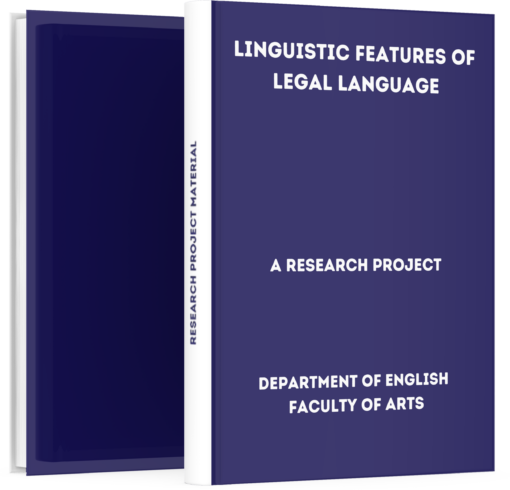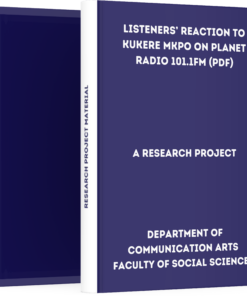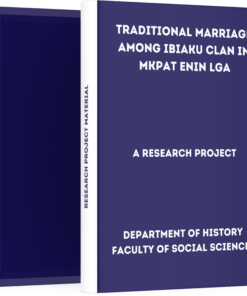Linguistic Features of Legal Language
₦3,000.00
If you are interested in getting this project material “Linguistic Features of Legal Language”, click on the DOWNLOAD BUTTON to make payment and the file will be delivered to your email immediately after confirmation.
Description
– Linguistic Features of Legal Language –
Download Linguistic Features of Legal Language. Students who are writing their projects can get this material to aid their research work.
Abstract
Legal language is a peculiar language used by law professionals designed for the sole objective of achieving justice through its normative and performative functions. In other words, it is used to impose rights and obligations, and equally regulate human behaviour and human relations.
The irony is that the language that performs these essential roles in the lives of every individual sounds strange to the majority of non-professionals as a result of its uniqueness as regards the register.
The concern of this research work is to investigate the distinct features of the language of acts, wills and deeds of assignment with a view to pointing out the relationship as well as the differences between them and the general syntactic structures and semantics of the English language.
To achieve these objectives, six documents were randomly selected from the nine documents chosen for the study. As regards the method of data collection, there is direct lifting of sentences from the selected documents. For data analysis, a descriptive survey is employed. The syntactic as well as the semantic features of the selected documents were investigated.
The summary of the result of the findings are as follows: legal language has a peculiar sentence structure. The peculiarity is as a result of the use of sentences that are characterized by embedded structures most of which are in form of phrases and clause adverbials.
There is also preponderant use of adjectivals, lexical repetition and unusual constructions. At the realm of semantics, the result shows that legal lexemes are made of mostly technical vocabulary. Doublets also characterize legal language.
This is a situation where synonymous words are used at a time in one environment. Other semantic discoveries include the use of foreign words/expressions and local terms.
Finally, there is evidence of improper use of punctuation marks. In view of the above, a conclusion was made and vital recommendations were made.
Introduction
1.1 Background of the Study
It is an undoubted fact that in every human affair language is ranked first. Human beings interact with one another with ease because they share a common code that makes up the language.
Language distinguishes man from animal. It is because of the use of language that man is called “a talking animal” (homo loquens) in the words of Pushphinder Syal and D.V. Jindal (6).
There are, however, other means of communication used by humans such as gestures, flags, horns, braille alphabet, mathematical symbols, morse code, sirens, sketches, maps, acting, miming, dancing, to mention no more.
All these systems of communication are extremely limited; they are not so flexible, comprehensive, perfect and extensive as language is (Syal and Jindal 5). With the use of language, human beings establish and maintain social relationship.
Expression of thoughts, feelings and emotions are equally done through the use of language. It is mostly through language that our non-material cultural heritage is preserved. It is also through the instrumentality of language that knowledge is imparted and disputes settled.
This implies that the language to be used to achieve these objectives must be clearly understood by the recipients because as soon as the bridge that holds communication collapses, the objective is defeated.
The Tower of Babel in the Holy Bible, a magnificent edifice that was to be constructed, was a failure as a result of incomprehensibility of language used among the builders.
How to Download this Project Material
First, note that we are one of the best and most reliable online platforms because we don’t retain any of your personal information or data as regards making payments online.
PRICE: ₦3,500 ₦3,000 (Three Thousand Naira Only)
Make a bank deposit or mobile transfer of ₦2,000 only to the account given below;
Bank Name: UBA Account Number: 1022564031 Account Name: TMLT PRO SERVICES
After making the payment, CLICK HERE to send the following on WhatsApp;
- Depositor’s Name or Screenshot of Payment
- Name of the Past Question
- Active Email Address
or Call Us On +2348082284439 Once your details have been received and your payment confirmed by us, you will receive the past question in your email or WhatsApp within 5 Minutes.
Guarantee of Getting the Material
We understand that due to the high rate of fraud, many people are afraid of making purchases online but be rest assured that PastExamQuestions will deliver your material after payment.
Once your details have been received and your payment confirmed by us, you will receive the past question in your email or WhatsApp.
Give us Feedback
Have we been able to satisfy you? How well do you think the material will be helpful after having gone through it? Does the price worth the material?
Let’s hear from you! We recommend that our customers give feedback at the end of every transaction to enable us to serve better. You can do this by clicking the review button on this page.
Where is the review button? >> Just scroll up to where you see reviews





Reviews
There are no reviews yet.